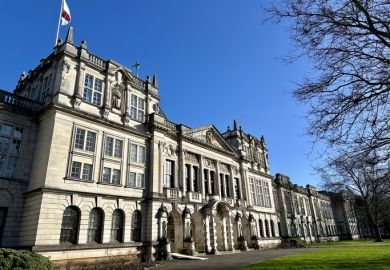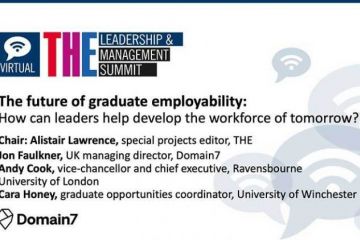The Principle of Sound Learning is that the noise of vulgar fame should never trouble the cloistered calm of academic existence," wrote F. M. Cornford a century ago. "Hence, learning is called sound when no one has ever heard of it; and 'sound scholar' is a term of praise applied to one another by learned men who have no reputation outside the university, and a rather queer one inside it. If you should write a book ... be sure that it is unreadable; otherwise you will be called 'brilliant' and forfeit all respect."
In flagrant disregard of Cornford's advice, we have chosen to disturb the calm and shout about the achievements of ten young academics in British universities who, we are told, are contributing enormously to their disciplines. For the purposes of this article we have defined "British" as "here a lot of the time at the moment" and "young" as 40 or under. If that rather loose definition of age doesn't have Cornford - who judged 50 "the threshold of old age" - turning in his grave, our determination to shine the vulgar spotlight of fame on the individuals below surely would.
Our list of ten academics was compiled after discussions with institutions, research councils and learned societies. It is not intended to be definitive or comprehensive - only illustrative of talent and originality. Nor do we wish to imply that the disciplines highlighted are somehow more important than ones neglected. We only trust, with some degree of confidence, that public praise of the young and gifted will not prove to be the impediment to success it so obviously was in Cornford's Cambridge.
Gerard Kelly, Editor
THE SPACE SCIENTIST
Name: Yang Gao
Age: 30
Position: Lecturer in space autonomy, University of Surrey
Career history: After gaining her PhD at Nanyang Technological University, Singapore, in 2003, Gao moved to the UK to start her career as an engineer specialising in space. Since 2004 she has been the technical lead and project manager of a number of internationally teamed projects funded by the European Space Agency and the UK Science and Technology Facilities Council. At Surrey, she is actively involved in space mission design. Gao is also building close links with space projects in China.
What they say
"The area she's working in is very high profile and interesting. She's one of the few young engineering academics who's involved in a whole range of activities," says Colin McInnes, director of research in mechanical engineering at the University of Strathclyde.
"She knew exactly what she wanted to do, using the links with China," he adds. "China is rapidly gaining space ambitions. It's very important for the UK to be involved with that. It's a great opportunity for the future."
In her own words
Gao is passionate about developing new technologies to improve the investigation of space and building bridges between individual countries' space programmes.
"I think this is a really good opportunity as a space engineer. I certainly see that space is going to be internationally active," she says.
"That means we have to work with people all over the world. I see myself as having an advantage in terms of the language. I can help build the bridge between colleges in the UK and colleges in China. And I can also help expand this network, not just to benefit our own group but other people in the UK."
She expects her current work on space rovers to be ready in five years, but she has longer-term ambitions with space programmes already in the pipeline over the next 15 years.
"I imagine that in the future we will have more than one rover working together and collaborating, working on Mars or the Moon. A team of rovers will be quite useful," she explains.
"We are looking at missions that are designed for 2020 - by that time the technologies should be ready for that. I definitely see myself working on this road for the foreseeable future."
THE PHILOSOPHER
Name: Christian List
Age: 34
Position: Professor of political science and philosophy, London School of Economics
Career history: After obtaining a DPhil in politics at Nuffield College, Oxford, in 2001, List worked as a postdoctoral research fellow at the college, later moving to the same post at the Australian National University. In 2002, he joined the LSE as a lecturer and later a reader in political science. Last year, he became a professor of political science and philosophy, using the position to focus on research around how groups make decisions.
What they say
"Christian List has made important contributions to social choice theory and decision theory, particularly in areas that lie at the intersection of political science, philosophy and economics," says a spokesman for the Institute of Philosophy at the University of London.
"He has worked with Philip Pettit of Princeton University on paradoxes that arise in deliberative democracy when opinions are aggregated - for example, how could it happen that a group of people all prefer a certain outcome but end up in deliberation to vote against it. Although (he is) still very young, his ideas are original and have wide influence."
When List won a Philip Leverhulme Prize in 2007, the Leverhulme Trust said: "Professor List's research brings together political science, philosophy and economic theory in exciting and original ways. At the forefront of advances is social choice theory, (and) he has already made a lasting impact in the new research field of judgment aggregation."
In his own words
"My work is relatively interdisciplinary. I expect there will be an increasing movement towards interdisciplinary work, particularly in my research area." List looks largely at how individual decision-making takes place and how that influences group decision-making. His findings are likely to be used to revisit debates in political philosophy.
"As far as our understanding of human decision-making goes, social science is still very much in its infancy. It's sad to say that these are still issues that need to be explored in much greater depth, so I do see a huge amount of potential in this overall research area for the future," List says. "I don't think it would be correct if we were to claim that my work has an immediate practical application, but the kind of work I do in this area certainly feeds into other people's work which would have very practical impacts."
THE MATHMETICIAN
Name: Kevin Buzzard
Age: 39
Position: Professor of mathematics, Imperial College London
Career history: A former PhD student of Richard Taylor, Buzzard was a "grand-student" of Andrew Wiles. Taylor and Wiles are well known for their proof of Fermat's last theorem. Since 1998, Buzzard has divided his time between Harvard University and Imperial. He was appointed professor at Imperial in 2004 and visiting professor at Harvard in 2006. He is concentrating on the Langlands philosophy, which looks at the links between number theories first postulated in the Seventies.
What they say
Some of Buzzard's best-known work involves using the techniques discovered by Taylor and Wiles. He was awarded the Whitehead Prize by the London Mathematical Society in 2002 for what the society termed his "distinguished work" in number theory.
"The Langlands philosophy is of tremendous importance and interest in mathematics, thus giving weight to Kevin's contribution," says former LMS president J. T. Stuart. "Kevin Buzzard is one of the liveliest of my colleagues, with broad interests, and is not one who sits in an ivory tower. In fact, he is an excellent lecturer and is popular with students; he has been awarded the Imperial College prize for teaching excellence.
"He is also an active collaborator in the mathematics genealogy project, whose aim is to track researchers and their descendants, grand-descendants and so forth, analogous to a family. (He can) reference his own descent from Andrew Wiles and Richard Taylor. Kevin has a good number of students, his own descendants."
In his own words
Buzzard's work may be theoretical, but it also has incredibly practical uses.
"My general subject area - number theory and algebraic symmetry - has links to cryptology and security," Buzzard says.
"Some of the algorithms for keeping your credit card details secure on the internet were discovered by number theorists. When there are breaches of security that make the news, this is almost always because of human error rather than some expert cracking a code discovered by a number theorist. The best codes invented by number theorists really do seem to be uncrackable currently."
The pure mathematician's work is focused on finding symmetries and exploring the potential links between them.
"I'm looking at some symmetries in algebra and some apparently similar symmetries in analysis, and I'm trying to find links between the two fields that explain why the symmetries seem to match up so well," he explains.
"It's like trying to guess what someone is holding behind their back and then noticing that they are standing in front of a mirror. Certainly one of the greatest achievements of the past 20 years in number theory is the proof by Wiles and Taylor of Fermat's last theorem, a 350-year-old conjecture, and this technique was key to their success.
"Links between distinct areas of mathematics are absolutely fundamental for its progress. Algebraic number theorists are making fast progress and it's our job to keep the momentum up, pushing current ideas as far as they can go and then coming up with new ones," he says.
"I hope that mathematicians on the whole will understand much more of the big picture, and it would be nice if I had contributed something to this understanding."
THE PSYCHOLOGIST
Name: Sarah-Jayne Blakemore
Age: 33
Position: Research fellow, Institute of Cognitive Neuroscience, University College London
Career history: After gaining her PhD at UCL, and a two-year stint working in Lyons, France, with support from the Wellcome Trust, Blakemore was granted the Royal Society Dorothy Hodgkin Research Fellowship to continue her studies at UCL in 2004. Last year, she was awarded a Royal Society research fellowship that will allow her to continue her work until 2013.
What they say
"She is undoubtedly one of the brightest stars among a new generation of psychologists, both nationally and internationally," say colleagues Jon Driver and Uta Frith.
A British Psychological Society spokesman said: "Sarah-Jayne has made significant contributions to the understanding of social cognition during adolescence, notably in the study of schizophrenia. Her work has been influential with government, specifically with the Select Committee for Education."
In her own words
"My group's research is in the area of social cognitive neuroscience. We are interested in the development of the brain during adolescence, and in particular the development of the brain basis of social interaction and empathy," Blakemore says.
"This is a new and rapidly expanding area in neuroscience. Understanding how the brain develops during adolescence might eventually have implications for education and for society's treatment of teenagers as well as our understanding of the numerous psychological disorders that start in adolescence.
"I am passionate about public engagement with science, in particular in educational settings. What will I be doing in 20 years? This is a new field, and there are still an enormous number of questions to be tackled, experiments to be done and theories to be developed."
THE HISTORIAN
Name: Kate Fisher
Age: 37
Position: Senior lecturer in history, University of Exeter
Career history: Fisher's academic career so far has been focused on researching intimacy within marriage in the 20th century. Her book Birth Control, Sex and Marriage in Britain, 1918-1960 (2006) received critical acclaim. She has now teamed up with classicist Rebecca Langlands to study how popular and academic ideas about sex have been expressed from the 18th century to the present day.
What they say
"Once upon a time, historians went to the archives and read documents," says a spokesman for the Royal Historical Society.
"Now historical research is undertaken by visiting old people's homes in South Wales and talking to the residents about their experiences of sex. From the wonderfully engaging material that Kate Fisher collected, she has produced a well-written, subtly analysed and skilfully argued book.
"This study is a fascinating contribution to the understanding of relationships within marriage and to gendered attitudes to sexuality more generally," the society says of her book. "It is also very humane, even moving."
In her own words
"Much of my work has involved interviewing pensioners about their sex lives," Fisher says.
"(I am) looking to show ways of listening to reminiscence that get behind cliche. Above all, I hope the readers of these works will enjoy the vivid and intimate stories that are at the heart of all my work," she says.
"It is all too easy to think of the sex lives of our parents and grandparents as inhibited and restricted, instead of listening carefully to the ways in which individuals themselves look back on their lives, and evaluated the choices they made, the challenges they faced and the pleasures they enjoyed."
THE PHYSICIST
Name: Ian Smail
Age: 40
Position: Royal Society research fellow, department of physics, Durham University
Career history: Smail moved to Durham to complete his PhD after undertaking a masters at the University of Cambridge. In 1993, having finished his thesis, he moved back to the US to take up a fellowship in his home state at the California Institute of Technology. After 18 months he moved to the Carnegie Institute of Washington, before returning to Durham in 1996. By 1998, he had received a Royal Society research fellowship.
What they say
Martin Ward, professor of physics at Durham, explains why Smail's work is so groundbreaking.
"Ian was the lead author on the first paper announcing the discovery at submillimetre wavelengths of a previously unknown population of young galaxies in the distant universe," Ward says.
"These galaxies potentially represent a missing link in our understanding of the relationship between the formation of black holes and the galaxies they live in. Ian was awarded one of the first Leverhulme prizes in astronomy in recognition of this work.
"Along with a small group of collaborators, Ian has been at the forefront of subsequent studies of the submillimetre galaxy population using a wide range of observational tools, such as the Gemini Telescopes, the UK's Infra-red Telescope and the James Clerk Maxwell Telescope, as well as the Hubble Space Telescope and other infra-red and X-ray space observation," he says.
"Ian's work has been very influential in highlighting the importance of the submillimetre window in astronomy for the study of galaxy formation. This is reflected in the fact that the more than 6,000 citations to his papers on this subject account for about half of all the citations to research in this field."
In his own words
"The research I'm interested in is looking at the formation of galaxies," Smail says.
"It's a bit like making the jigsaw with half of the pieces. We have to collect the most information that we can and then fill in the bits.
"It's formally a science, but at its edges it's also more like geography or sociology. What we're trying to do is to get a model of how our galaxies formed," he says.
Smail is working with the newest technologies and telescopes to look at early pictures of the Milky Way that capture the galaxy in its infancy 10 billion years ago.
His work will be improved, he says, by the use of developing technologies.
"Astronomy is a very facilities-driven area. My research is focused around the facilities that will be coming up in the next five to ten years."
THE ECOLOGIST
Name: Yadvinder Malhi
Age: 39
Position: Jackson senior research fellow, Oriel College, Oxford
Career history: After receiving a PhD in meteorology from the University of Reading, Malhi began his postdoctoral work at the University of Edinburgh. In 2000, he founded the Amazon Rainforest Inventory Network and was appointed lecturer at the University of Oxford Centre for the Environment in 2005. By 2007, he had become professor of ecosystem science.
What they say
"He is working on one of the key climatic issues of our time in one of the key places - the Amazon," says Sue Grimmond, professor of climatology at King's College London and a former president of the International Association of Urban Climate.
"His research addresses fundamental questions about ecosystem function and dynamics, informing scientific understanding, but also (has) direct relevance for conservation and adaptation to climate change," she says.
She has also been impressed by Malhi's work examining the role that international carbon markets and climate-change policy can play in protecting tropical rainforests. "There is a very strong collaborative element to his work, with colleagues in Brazil and in the US, and strong engagement by students and postdocs," Grimmond says.
In his own words
"My focus comes from the two strands of my background," Malhi explains. "One of those is as a meteorologist and climatologist. The other strand is on forest ecology and ecosystems. I'm trying to bridge these two disciplines."
He is researching how climate controls the life of tropical rainforests and how climate change will affect them, collecting data through long-term field studies. "Part of my work is still to understand how climate change affects tropical rainforests," he says. "The idea is to set up a network that carries on for the rest of this century as an ongoing early-warning system about forest ecology."
Malhi sees that his research will also be able to inform global political policy on climate change and conservation of tropical rainforests. "We're looking first at providing the science that can inform those decisions and second at exploring some of the policy issues around that.
"At the moment, there are huge opportunities for their conservation. It's almost inevitable for me to continue working in tropical climates when one expects that we can contribute to the conservation priorities and development priorities."
THE NEUROLOGIST
Name: Don Mahad
Age: 38
Position: Intermediate clinical fellow, School of Neurology, Neurobiology and Psychiatry, Newcastle University
Career history: Mahad completed his PhD at the University of Sheffield between 1998 and 2001, taking as his primary research area the study of the inflammatory aspects of multiple sclerosis. After a short period working in clinical research in the US, he returned to the UK. He accepted a post at Newcastle, where he has been supported in his work by the Wellcome Trust.
What they say
John Williams, lead for clinical activities at the Wellcome Trust, says: "I think Don is an example of a talented guy who has chosen to follow the very challenging pathway of wishing to become a leading clinical academic.
"What impressed us about Don was the way that he really had gone about constructing his career path. He had thought very carefully at every stage of his career about his aspirations.
"He has competed successfully at every level for externally funded support, which is a statement to his talents and of his mentors and support network," Williams says.
"Don is particularly unusual in that he was able to spend some time as a postdoctorate fellow in the States. He had recognised the need to broaden his research horizons to gain the key educational skills he would need to become a successful clinical scientist."
In his own words
"All my research relates to multiple sclerosis. We're looking at the energy-producing aspects of MS."
In particular, Mahad is researching the role of energy-producing organelles (cellular subunits) - mitochondria - in the onset and the development of MS.
"They're smaller than a pinhead, but they're very important in terms of producing the energy that we need. If you have a problem with these, then it gives rise to a lot of problems affecting the brain and the muscles," Mahad says.
"We have identified defects in the very early stages of aggressive forms of multiple sclerosis. We don't really understand the processes that cause this type of damage at the late stages of MS."
It is hoped that Mahad's research will help to develop new therapies to halt the progress of the disease and to provide relief to the 80,000 people who suffer from the condition in the UK.
He is also keen to set up a UK-based institute for MS research with both academic and clinical expertise, similar to those he has visited across the Atlantic.
"There are great examples of where it's important to have people who do both because there are scientists who are doing very well through studies without actually being aware of the clinical implications of that. Being able to tie the two together is the thing to do, and funding bodies are encouraging these things," he says.
"My long-term aim is to have an active lab where we can answer these questions and test these therapeutic targets."
THE ECONOMIST
Name: Nick Bloom
Age: 35
Position: Assistant professor of economics, Stanford University, and productivity programme manager, Centre for Economic Performance, London School of Economics
Career history: After completing his PhD at University College London, Bloom moved to the Institute for Fiscal Studies as a research economist. He was seconded to HM Treasury between 2001 and 2002 to work as a tax policy adviser.
In 2003, he joined the LSE in his current role. Two years later, he took up the post at Stanford and began to split his time between London and the US. His work focuses on the relationship between management practices and productivity, and the importance of competition as a driver of innovation.
What they say
"He focuses on the key drivers of innovation and productivity growth - the question that has been at the heart of UK economic policy concerns for at least a decade," says Romesh Vaitilingham, adviser to the Royal Economic Society. "Nick is someone who recognises the value of communicating with the wider world, both for his own career development and to make a difference to policy and practice.
"Nick's work on uncertainty and on management practices has also been written up in two full-page articles in The Economist. This is an achievement to which a large part of the profession increasingly aspires, both for its impact on movers and shakers in the private sector and public policy around the world, and in terms of its impact on individual careers.
"Nick and his CEP colleagues are now working with the World Bank to incorporate the managerial and organisational survey into their global firm-level surveys to provide a large public-access data set. (They are) looking at the impact of competition arising from the rapid growth of Chinese imports on both the innovation and technology adoption of European and US firms."
In his own words
"I'm trying to explain why some countries have different growth rates from others and linking this in particular to management and innovation. We have been poorer than the Americas for about 50 years, and one of the reasons might be worse management practices. This has a real impact on individuals' lives in the UK."
Bloom has a close relationship with economic policymakers worldwide. "We're talking to them a lot," he says. "I'm working with the World Bank. I talk to the Treasury in the UK, and the Department of Trade and Industry. We're doing a piece of work for the European Commission. We have been talking quite a lot to the Indian Government as well."
In future, Bloom will attempt to collect a new type of data to measure productivity: "Not just collecting data, but trying to get evidence of causation," he says, "and trying to measure and understand how important management practice is."
THE SOCIOLOGIST
Name: Bridget Byrne
Age: 39
Position: Lecturer in sociology, University of Manchester
Career history: After completing an MA in gender and development, and her PhD at the University of Sussex, Byrne taught at the London School of Economics and Goldsmiths, University of London, before moving to Manchester six years ago. Her book White Lives: The Interplay of Race, Class and Gender in Everyday Life was critically acclaimed, and both informed and sparked debate on race nationally, even featuring on the Radio 4 programme Thinking Allowed.
What they say
"There are so many brilliant sociologists out there," says the British Sociological Association, "but one way that the BSA encourages and identifies rising stars in the discipline is through its annual Philip Abrams Memorial Prize. The BSA established this prize to stimulate new ideas and fresh research in sociology by encouraging new British authors."
Byrne won the award for White Lives in 2006.
"The particular strength of Byrne lies in the scholarly theoretical agenda that she sets for her empirical research. She ties together the trajectories of feminist thinking and the sociology of race and racism with great deftness and subtlety," the judges said. "It represents the state of the art in its field, particularly in its integration of theory and empirical research."
They said the book was "very readable, logically presented and useful theoretically, methodologically and in policy terms".
In her own words
Byrne is modest about the obvious impact her work has had. "I don't see myself as someone who directly has a dialogue with policymakers, but I do hope I'm contributing. Clearly, it's something that's in the public debate," she says.
Her current and future research is set to have the same popular appeal, tapping as it does into a very topical and difficult discussion of race and class, and how the two interact. She is looking into a follow-up work analysing school selection under these criteria. "A lot of school choice is about middle-class prejudices and exercising middle-class privileges. I'm trying to insert race into that debate."
In the future, Byrne hopes to investigate the questions posed by multiple nationality. "I'm quite interested in how the holding of a passport can affect how your life is shaped," she says.
Register to continue
Why register?
- Registration is free and only takes a moment
- Once registered, you can read 3 articles a month
- Sign up for our newsletter
Subscribe
Or subscribe for unlimited access to:
- Unlimited access to news, views, insights & reviews
- Digital editions
- Digital access to THE’s university and college rankings analysis
Already registered or a current subscriber?













